
Alfalfa - Plant
(MRP Inclusive of all taxes)
- Shipping ₹79 for entire order
- Country of origin: India

(MRP Inclusive of all taxes)
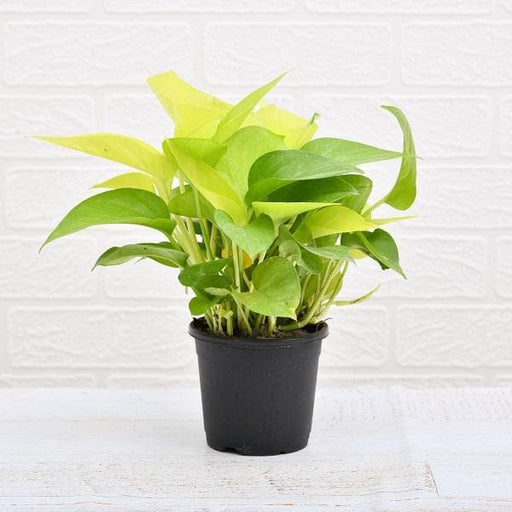 Save 29%
Save 29%
Air Purifier Money Plant with Pot The Air Purifier Money Plant, also known as Pothos or Epipremnum aureum, is a stunning indoor plant that...
View full details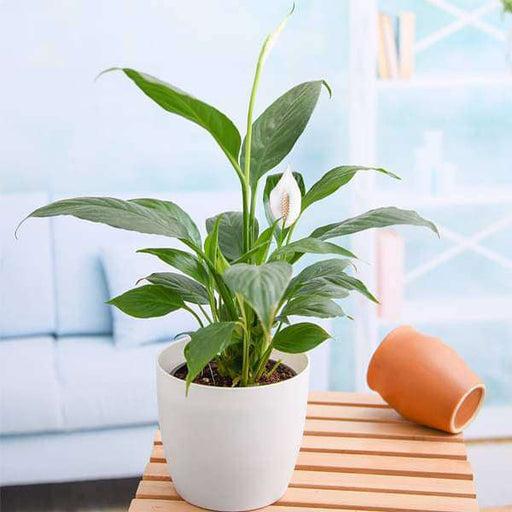
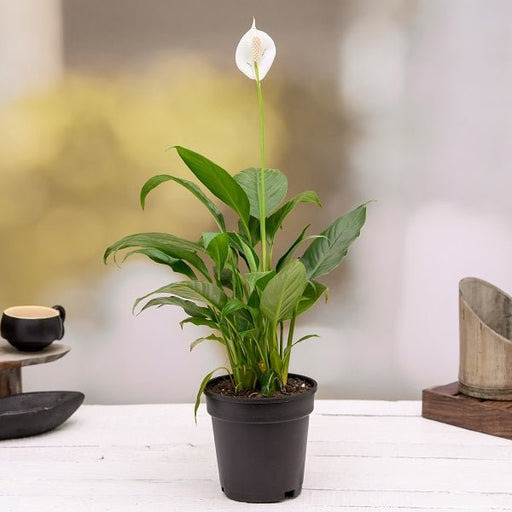 Save up to 15%
Save up to 15%
Peace Lily, Spathiphyllum - Plant The Peace Lily, scientifically known as Spathiphyllum, is a stunning houseplant celebrated for its elegant white...
View full details
 Save 25%
Save 25%
Jasminum sambac, Mogra, Arabian Jasmine - Plant Jasminum sambac, commonly known as Mogra or Arabian Jasmine, is a fragrant flowering plant...
View full details
 Save 18%
Save 18%
Combo Constituents Includes the Parijat Tree (Night-Flowering Jasmine), a culturally significant plant with fragrant flowers. Description The Pari...
View full details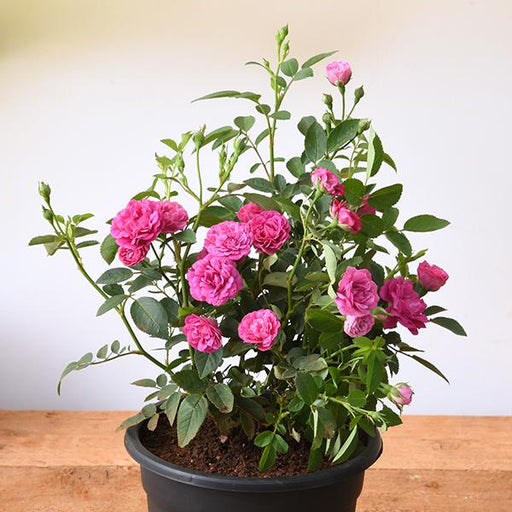
 Save 25%
Save 25%
Miniature Rose, Button Rose (Any Color) - Plant The Miniature Rose, also known as the Button Rose, is a charming and compact flowering plant that ...
View full details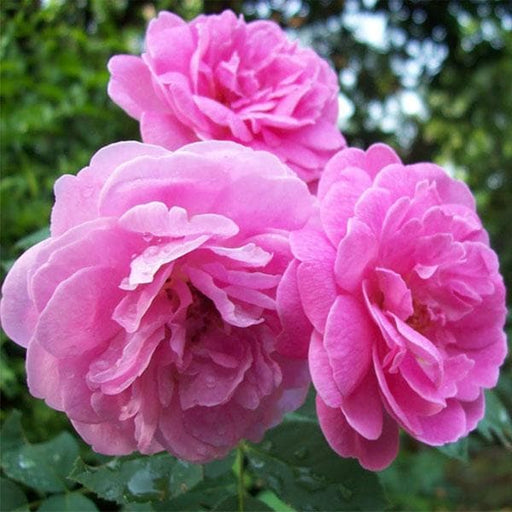 Save 25%
Save 25%
Damascus Rose, Scented Rose (Any Color) - Plant The Damascus Rose, also known as Rosa damascena, is a timeless symbol of beauty and romanc...
View full details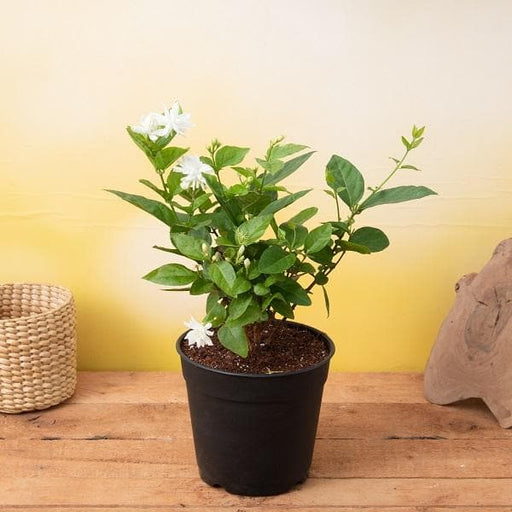
 Save 17%
Save 17%
Beautiful Fragrant Mogra, Arabian Jasmine Plant with Pot The Beautiful Fragrant Mogra, also known as Arabian Jasmine (Jasminum sambac), is...
View full details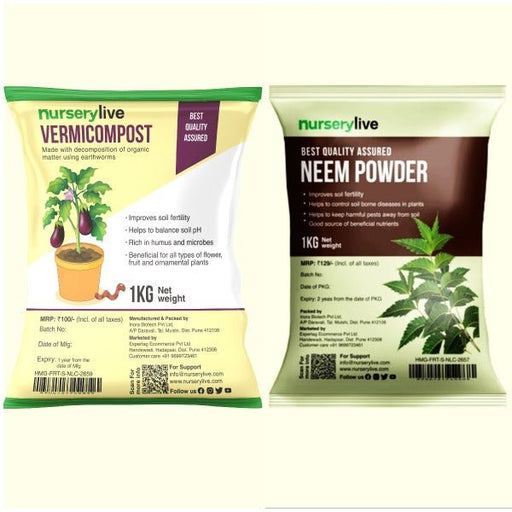 Save 15%
Save 15%
Pack of Vermicompost and Neem Cake for House Plants Transform your indoor garden with our premium Pack of Vermicompost and Neem Cake, spec...
View full details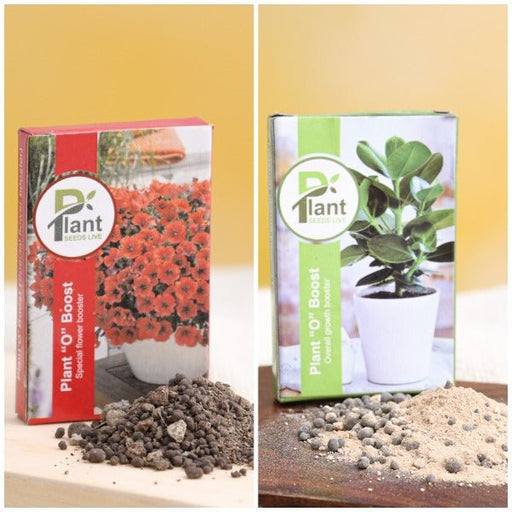
Pack of Plant Growth and Flower Boosters Unlock the full potential of your garden with our Pack of Plant Growth and Flower Boosters! This ...
View full details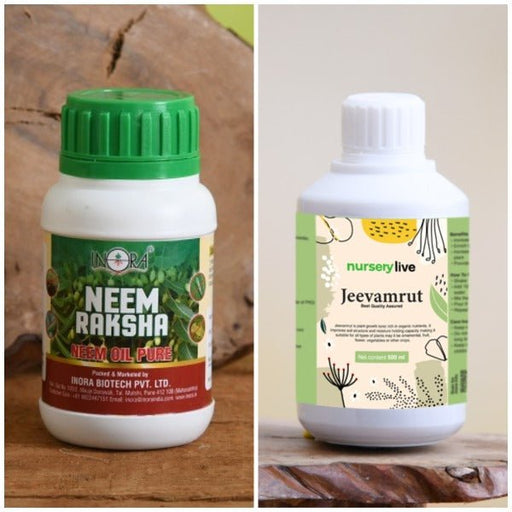 Save 38%
Save 38%
Combo of Jeevamrut and Neem Raksha for Easy Growth and Protection of Houseplants Transform your indoor garden with our exclusive combo of ...
View full details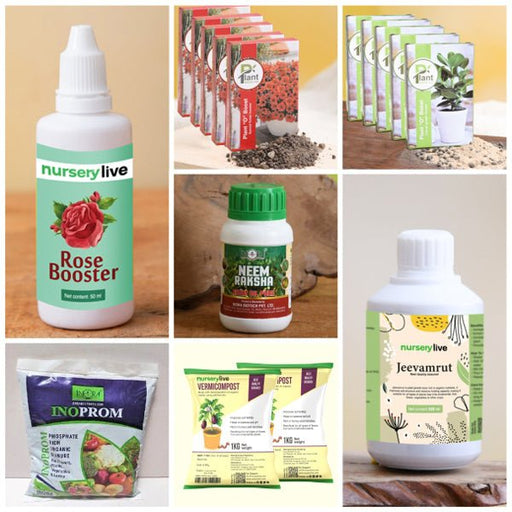 Save 22%
Save 22%
Plant Nutrients Kit (Pack of 16) for a Healthy Garden Transform your garden into a lush paradise with our Plant Nutrients Kit, featuring 1...
View full details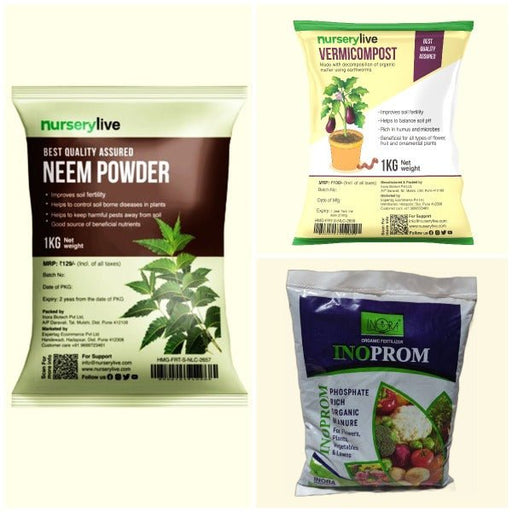 Save 16%
Save 16%
Combo of Top Plant Fertilizers Elevate your gardening game with our exclusive Combo of Top Plant Fertilizers, featuring two bags of premiu...
View full details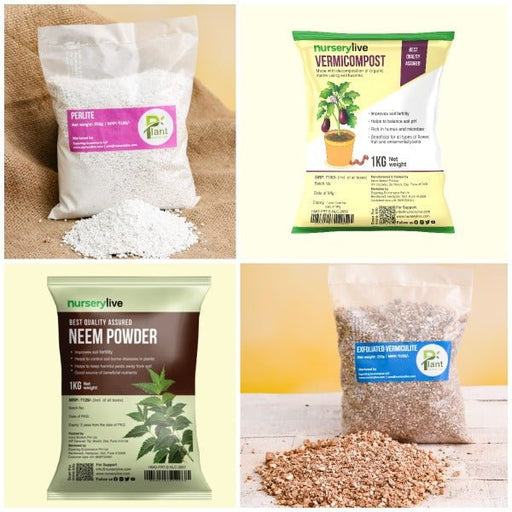 Save 24%
Save 24%
Pack of 4 Additives to Make Soil Healthy and Nutrient Rich Transform your garden into a thriving ecosystem with our Pack of 4 Additives de...
View full details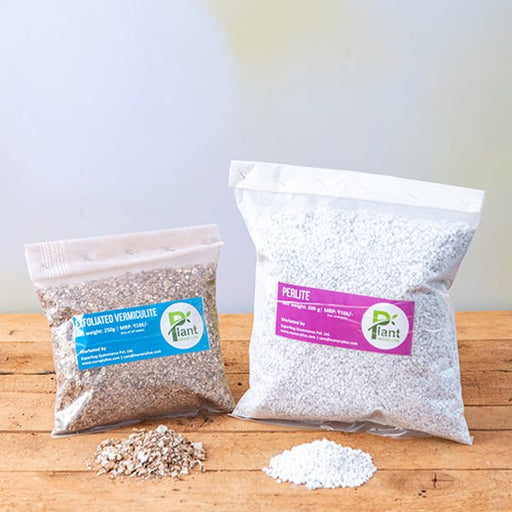 Save 30%
Save 30%
Transform your gardening experience with our premium Combo of Perlite and Vermiculite. This unique blend is designed to enhance soil aeration and ...
View full details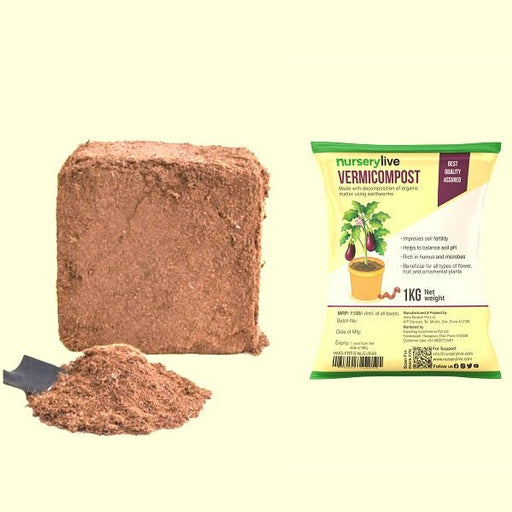 Save 27%
Save 27%
Combo of 2 Vermicompost and Cocopeat - Enrich Your Soil Naturally! Transform your garden into a thriving ecosystem with our Combo of 2 Ver...
View full details
 Save 35%
Save 35%
Best 6 Plants for Perfect Indoor Garden Transform your living space into a lush oasis with our curated collection of the Best 6 Plants for a...
View full details
 Save up to 50%
Save up to 50%
Mini Succulent Garden Pack Transform your space with our Mini Succulent Garden Pack, featuring a delightful collection of 4 any variety beautiful s...
View full details
 Save 30%
Save 30%
5 Best Fragrant Plants Transform your garden or indoor space into a fragrant paradise with our curated selection of the 5 Best Fragrant Plants. Th...
View full details
 Save 24%
Save 24%
Set of 2 Bonsai Looking Grafted Adeniums Transform your indoor or outdoor space with our exquisite Set of 2 Bonsai Looking Grafted Adenium...
View full details Save 45%
Save 45%
Top 4 Die Hard Succulents Pack Transform your indoor or outdoor space with our Top 4 Die Hard Succulents Pack, featuring a curated selecti...
View full details
 Save 30%
Save 30%
5 Best Indoor Plants Pack Transform your living space into a lush oasis with our '5 Best Indoor Plants Pack.' This carefully curated collection fe...
View full details
 Save 25%
Save 25%
Set of 4 Evergreen Air Purifier Plant Pack Transform your indoor space into a lush, green oasis with our Set of 4 Evergreen Air Purifier Pla...
View full details| SrNo | Item Name |
|---|---|
| 1 | Alfalfa - Plant |
Alfalfa (Medicago sativa) is a perennial flowering plant in the legume family, renowned for its high nutritional value and versatility. Often referred to as "the father of all foods," alfalfa is rich in vitamins, minerals, and protein, making it a staple in both human and animal diets. Its deep root system allows it to thrive in various soil types, contributing to soil health and preventing erosion.
What makes alfalfa special is its ability to fix nitrogen in the soil, enhancing fertility and promoting sustainable agriculture. This remarkable plant can grow up to 3 feet tall and produces vibrant purple flowers, attracting beneficial pollinators. Alfalfa is not only a superfood but also a key player in regenerative farming practices.
One of alfalfa's standout features is its high protein content, which can reach up to 25% in its leaves. This makes it an excellent forage crop for livestock, while its rich fiber content aids in digestion. Additionally, alfalfa is a source of antioxidants and phytonutrients, contributing to overall health and wellness.
Alfalfa plays a significant role in sustainable agriculture by improving soil health and reducing the need for chemical fertilizers. Its deep roots help prevent soil erosion and promote water retention, making it an excellent choice for dryland farming. By fixing nitrogen in the soil, alfalfa enhances biodiversity and supports a healthier ecosystem.
Alfalfa isn’t just a pretty face in the plant world; it’s a nutritional powerhouse! Packed with vitamins, minerals, and protein, this green wonder is like the Swiss Army knife of plants. Whether you’re looking to boost your diet or impress your friends with your knowledge of superfoods, alfalfa has got your back. It’s like the friend who always brings snacks to the party—everyone loves it, and it’s good for you too!
Think you can’t grow alfalfa? Think again! This resilient plant is like the overachiever of the garden. With a little sunlight, well-drained soil, and some TLC, you’ll have a lush patch of alfalfa in no time. It’s the perfect project for those who want to feel like a gardening guru without the need for a PhD in botany. Just remember, patience is key—good things come to those who wait!
If you’re on a quest for the ultimate health food, look no further than alfalfa. This leafy green is loaded with vitamins A, C, E, and K, plus a treasure trove of minerals like calcium and potassium. It’s like a multivitamin that grows on trees—well, sort of. Toss it in salads, smoothies, or even as a garnish, and watch your health soar. Who knew being healthy could taste so good?
Alfalfa sprouts are the tiny, crunchy superheroes of the salad world. These little guys pack a punch of flavor and nutrition, making them the perfect addition to sandwiches, wraps, and salads. They’re like the confetti of the culinary world—small but oh-so-important! Plus, they’re super easy to grow at home, so you can impress your friends with your green thumb and your culinary skills.
Ever thought about sipping on some alfalfa tea? It’s not just for hipsters and health nuts; this herbal infusion is a delightful way to enjoy the benefits of alfalfa in a cozy cup. With a mild, earthy flavor, it’s like a warm hug for your insides. Plus, it’s packed with antioxidants, making it a guilt-free indulgence. So, brew a cup, kick back, and let the alfalfa magic work its wonders.
Farmers, rejoice! Alfalfa is the go-to feed for livestock, and for good reason. It’s like the five-star restaurant of the animal kingdom, providing essential nutrients and protein to keep your critters happy and healthy. Cows, goats, and rabbits can’t get enough of this green goodness. So, if you want your livestock to thrive, make sure alfalfa is on the menu. Your animals will thank you with happy bleats and mooing!
Alfalfa isn’t just a snack for animals; it’s a gardener’s best friend too! This plant is a natural fertilizer, enriching the soil with nitrogen and improving its structure. It’s like the fairy godmother of your garden, turning your patch of dirt into a thriving oasis. Plus, it attracts beneficial insects, making it a win-win for your green space. So, sprinkle some alfalfa seeds and watch your garden flourish!
Want to give your soil a makeover? Alfalfa is here to help! This plant’s deep roots aerate the soil, while its leaves decompose to add organic matter. It’s like a spa day for your garden—refreshing and rejuvenating! By planting alfalfa, you’re not just growing a plant; you’re investing in the health of your soil for years to come. Talk about a long-term relationship!
Looking to shed a few pounds? Alfalfa might just be your new best friend. Low in calories but high in fiber, it keeps you feeling full without the guilt. It’s like the supportive friend who encourages you to make healthy choices while still enjoying life. Add alfalfa to your meals, and you’ll be on your way to a lighter, healthier you. Who knew weight loss could be so delicious?
Alfalfa is not just a pretty plant; it’s also a hormonal balancing act! Rich in phytoestrogens, it can help regulate hormones, making it a favorite among women. It’s like having a personal trainer for your hormones—supportive and always there when you need it. So, if you’re looking for a natural way to keep your hormones in check, alfalfa might just be the answer you’ve been searching for.
If your tummy could talk, it would sing praises for alfalfa! This plant is a digestive superstar, loaded with fiber that keeps things moving smoothly. It’s like a gentle nudge for your digestive system, helping to prevent bloating and discomfort. So, if you want to keep your gut happy, add some alfalfa to your diet. Your stomach will thank you with a satisfied sigh!
Alfalfa is a leguminous plant, often dubbed the "king of forage." It's packed with nutrients, making it a favorite among livestock and health enthusiasts alike. Think of it as the leafy green superhero of the plant world, swooping in to save the day with its protein, vitamins, and minerals.
Alfalfa is like nature's multivitamin! It's rich in vitamins A, C, E, and K, plus minerals like calcium and iron. This nutrient powerhouse supports everything from bone health to digestion. So, if you want to feel like a million bucks, sprinkle some alfalfa on your salad and let the magic happen!
Growing alfalfa is easier than pie—just not as tasty! Start with well-drained soil and plenty of sunlight. Plant seeds in spring or fall, water them, and watch them flourish. In no time, you'll have a lush green patch that’ll make your neighbors green with envy. Just remember, patience is key!
Absolutely! Alfalfa sprouts are a crunchy, nutritious addition to salads and sandwiches. They’re like the tiny, green confetti of the culinary world. Just rinse them well, and you’re ready to add a fresh twist to your meals. Who knew healthy could be so fun
Alfalfa is the VIP of livestock feed! It’s high in protein and fiber, promoting healthy growth and milk production. Cows, goats, and horses all adore it. Feeding them alfalfa is like giving them a gourmet meal—one that keeps them happy and healthy, and you’ll be the hero of the barn!
Alfalfa can be your secret weapon in the weight loss game! Low in calories but high in fiber, it helps you feel full without the guilt. Toss it in your meals, and you’ll be on your way to shedding those pesky pounds while enjoying a tasty, nutritious treat.
Yes, indeed! Alfalfa is a fiber-rich friend that promotes healthy digestion. It helps keep things moving smoothly in your gut, reducing bloating and discomfort. So, if your tummy is feeling a bit rebellious, a sprinkle of alfalfa might just be the peacekeeper you need.
The best way to consume alfalfa is however you fancy! Toss it in salads, blend it into smoothies, or munch on sprouts. You can even find alfalfa supplements if you prefer a quick fix. Just remember, the more creative you get, the more fun it is to eat healthy!
While alfalfa is generally safe, moderation is key! Some folks may experience digestive issues or allergic reactions. Pregnant women should consult their doctor, as alfalfa can affect hormones. So, enjoy your alfalfa, but listen to your body—it's the best guide to your health!
Alfalfa is a soil superhero! Its deep roots aerate the soil, while its nitrogen-fixing abilities enrich it. This means healthier plants and happier gardeners. Plus, it’s a great cover crop, preventing erosion and keeping weeds at bay. So, plant alfalfa, and your garden will thank you!
Absolutely! Alfalfa powder or sprouts can add a nutritious punch to your smoothies. Just blend it with your favorite fruits and veggies, and voilà! You’ve got a green drink that’s not only good for you but also makes you feel like a health guru. Cheers to that!
Alfalfa has a rich history, dating back over 2,000 years! Originally cultivated in Persia, it spread across the globe, becoming a staple for livestock and humans alike. Its name means "father of all foods" in Arabic, and it’s lived up to that title ever since. Talk about a legacy!